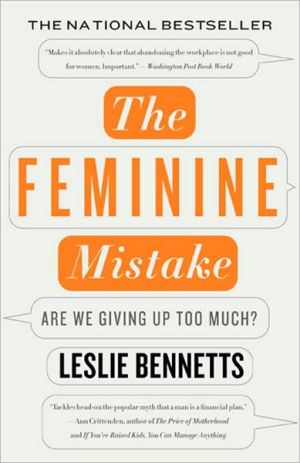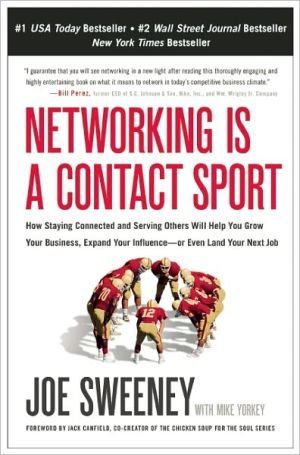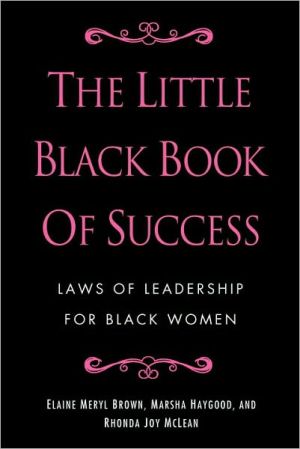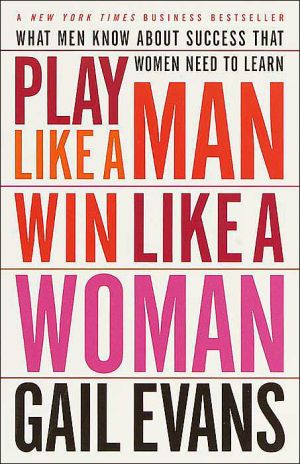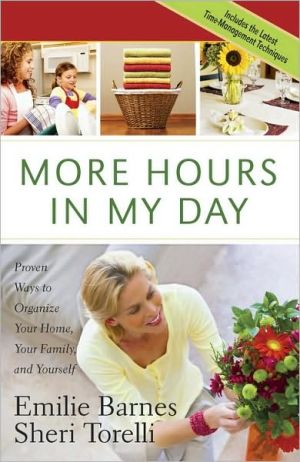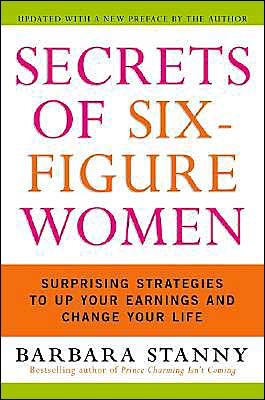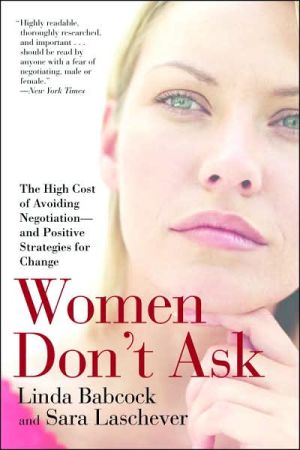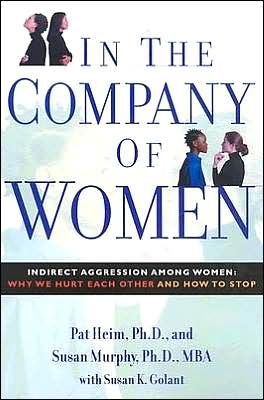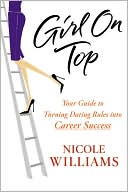The Feminine Mistake: Are We Giving Up Too Much?
Women are constantly being told that it's simply too difficult to balance work and family, so if they don't really "have to" work, it's better for their families if they stay home. Not only is this untrue, Leslie Bennetts says, but the arguments in favor of stay-at-home motherhood fail to consider the surprising benefits of work and the unexpected toll of giving it up. It's time, she says, to get the message across -- combining work and family really is the best choice for most women, and...
Search in google:
Women are constantly being told that it's too difficult to balance work and family, so if they don't really "have to" work, it's better for their families if they stay home. Not true, Leslie Bennetts says-in fact, the arguments in favor of stay-at-home motherhood leave out the surprising advantages of work and the unexpected toll of giving it up. Combining work and family really is the best choice for most women, she says, and it's eminently doable.Bennetts and millions of other working women provide ample proof that there are many different ways to have kids, maintain a challenging career, and enjoy a richly rewarding life as a result. The truth is that when women gamble on dependency, most eventually end up on the wrong side of the odds-and miss out on the intellectual, emotional, psychological, and even medical benefits of self-sufficiency.Not since Betty Friedan has anyone offered such an eye-opening and persuasive argument for why women can-and should-embrace the joyously complex lives they deserve. The Philadelphia Inquirer As wise an argument as has been proffered in some time . . . there are too many smart women who choose to be ignorant about the financial structure that supports the family.Until it doesn't.
The Feminine Mistake\ \ By Leslie Bennetts \ Hyperion\ Copyright © 2007 Leslie Bennetts\ All right reserved.\ ISBN: 978-1-4013-0306-8 \ \ \ Prologue\ My grandmother made the world's best rhubarb pies and sewed extraordinary silk garments with exquisite craftsmanship worthy of a French couturier. Raised to devote her all to marriage and family, she worshipped her talented husband, doted on her children, and baked homemade bread whose enticing aroma drew everyone to the kitchen. Although she lived for nearly eighty years, she never worked outside the home or held a paying job. \ Such latter-day paragons of traditional femininity often make people nostalgic for bygone times, but even then, the truth was frequently a lot darker than the champions of conventional gender roles like to admit. Although my grandmother's life adhered faithfully to the old-fashioned stereotypes so often held up as a modern ideal, the result was a disaster, not only for her but also for her children and relatives.\ In 1932, when my mother was nine years old, her father left the family for his mistress, a stylish black-haired beauty unencumbered by the mundane burdens of domesticity. For my grandmother, who came from a well-to-do family, the emotional devastation of losing her husband was exacerbated by the dizzying plunge into poverty that accompanied it. My grandfather was an architect who had done pioneering work with men like Philip Johnson andR. Buckminster Fuller, but employment was hard to come by during the worst years of the Depression, and he soon defaulted on his financial obligations to his wife and children.\ Left with no means of support, my grandmother considered getting a job, but her straitlaced sisters pressured her not to do so. Firmly in thrall to the Victorian concept of "separate spheres" that divided the world according to gender, they believed that men should be the breadwinners and that women-or at least ladies-should not work outside the home. If my grandmother began supporting herself, her sisters warned, that would absolve her husband of his familial responsibilities, and then he would never return to his wife and children. Best to wait until he got tired of "that trollop," as my grandmother and her sisters referred to the Other Woman (who may have been an adulteress but was also a hardworking schoolteacher with considerably more modern ideas about women's place in the world).\ The loss of her husband left my grandmother virtually paralyzed with grief; according to family lore, she simply went to bed for two years. My mother's older brother was soon out of the house, so my mother was left on her own to care for my deeply depressed grandmother. In addition to the emotional toll that entailed, the rest of my mother's childhood was blighted by one financial crisis after another as she and my grandmother were evicted from a series of increasingly shabby apartments, unable to keep up with the rent.\ My grandmother's family owned a great deal of land out west, but as a woman she was deemed unable to manage her own affairs, so her only brother assumed control of her share of the family assets. Over time, he apparently "managed" my grandmother's property out of her name and into his own. As a result, she was forced to depend on the charity of her four sisters-or, to be more precise, their wealthy husbands-for support.\ My grandfather's abdication of financial responsibility also torpedoed my mother's dream of attending Vassar. She was elated at being accepted, and my grandfather had promised to pay the tuition. But the day before my mother left for college, she learned that her father hadn't paid for her enrollment-and wouldn't be doing so. By then my great-uncles were all tired of being saddled with financial responsibility for their sister-in-law, so my mother went to work and supported them both while putting herself through school, eventually graduating from Barnard College.\ My grandmother spent the next forty years mourning the loss of her marriage and waiting for her ex-husband to come back to her, even though he had long since wed his mistress. Until the day she died, my grandmother clung to the illusion that her husband would eventually return to her. In all those years, she never looked at another man, politely but firmly turning away all suitors. Nor did she ever question the strictly segregated gender roles that prevented her from exploring her own potential. As far as she was concerned, marriage was "for time and all eternity," just as her wedding ceremony had promised, and her role in life was as a wife, even when there was no husband around.\ In the meantime, my mother had met and married my father, giving up her budding career as an actress in order to stay home and have her own family. But when she asked him to take over the financial support of my grandmother, my father declined, unwilling to shoulder that long-term responsibility.\ So when I was five and my brother was four, my mother took a job at a publishing company where she worked her way up from secretary to copy editor to children's-book editor. From her own earnings, she paid her mother to take care of my brother and me after school. This was fine with us; our grandma made up wonderful stories and sewed elaborate costumes for the plays we wrote and staged in our basement. My mother never had to worry about whether we were well cared for, and I don't think she ever had a guilty conscience about going to the office every day, because we adored being with our grandma.\ Our mother left the house every morning with a briefcase and commuted into the city with all the men in their gray flannel suits. In an era when such choices were rare, I was the only one of my friends whose mother was a professional woman. But in other respects, she functioned like a typical 1950s housewife. Every night she came home and made an elaborate meal for our family-no TV dinners for us!-along with baking cookies for the next day's Girl Scout meeting, cleaning the house, washing and ironing our clothes for school, and helping us with our homework while my father dozed in front of the television set.\ Although she undoubtedly didn't get enough sleep, my mother never complained. To the contrary; she told us all the time how lucky she felt. After the insecurity and humiliation of her childhood, she was thrilled to have a comfortable home and a stable family. She loved being a mother, but she also enjoyed her work, which she talked about with enthusiasm. As a result, it never occurred to me that a woman couldn't have both.\ My mother supported my grandmother until she died, shortly before her eightieth birthday, still waiting for her husband to come back. He died soon afterward, leaving the "trollop," by then a sweet white-haired little old lady who had been his wife for more than four decades, as his widow.\ Although I understood that my grandmother had spent most of her life quietly nursing a broken heart, the larger significance of this family history was lost on me until my mother heard about The Feminine Mystique and gave it to me. "Read this," she said, so I did.\ That book had such a profound effect on American culture that Betty Friedan used the most frequent comment she heard from her readers as the title of a subsequent book: It Changed My Life. It certainly changed mine; I was thirteen when The Feminine Mystique was published, and it helped to guide my views and choices from then on. By the time I was a teenager, my parents had moved from Manhattan's Upper East Side to a Westchester suburb, and I was beginning to notice how much truth there was in Friedan's observations about affluent women trapped in unsatisfying domestic lives. Palpably unhappy, many of my friends' stay-at-home mothers were doubly wounded when their marriages broke up as soon as their kids left for college. My parents were among the few couples we knew who stayed together.\ In retrospect, it's hard to parse the varied influences that shaped my life. How much of a role did one revolutionary book play in determining my future? How much did I learn from my own family history? Since my coming-of-age coincided with the blossoming of modern feminism, how many of my choices were simply a product of the exhilarating times I grew up in during the 1960s and '70s, when the very air seemed electric with the promise of exciting new possibilities?\ Back then, even as conservatives railed against the changes being wrought by the women's movement, it was clear to me that the conventional social roles hadn't necessarily worked out very well for the women who actually lived them. When my grandmother was abandoned by her husband and swindled out of her share of the family fortune by her brother, the prescribed gender roles of her day rendered her powerless to deal effectively with either calamity. Because those roles were so confining, she never replaced her identity as a wife and mother with an independent life that might have consoled and sustained her during the decades she spent alone.\ I certainly knew that my mother had been forced to go to work by my grandmother's lifelong economic dependency, which burdened so many other family members over the years. I knew that my father had refused to assume the financial support of my grandmother-but I also knew that this abdication of patriarchal responsibility had galvanized my mother into forging a career that proved to be enormously gratifying.\ In the end, it became far more than that. The summer before I graduated from the University of Pennsylvania, my mother and I went to Europe for three weeks. My father had worked for the same company since he was a young man, and his life savings were invested in its stock. That company had just been taken over by a conglomerate whose stock price suddenly plummeted while my mother and I were away. By the time we got home, the stock was worth next to nothing. Our family's substantial net worth had simply vanished.\ My mother couldn't believe that my father had just watched this catastrophe unfold, doing nothing to salvage our assets. How could he have been so passive when confronted by a colossal disaster that would forever alter our lives? When the stock price began its nosedive, why hadn't he sold our shares? My father, who assumed that it would eventually recover, had no answer. Nor did he have an income; nearly two decades older than my mother, he had recently retired and was no longer earning the handsome salary that had paid for my expensive riding camp and Ivy League education. But my mother was still working, so she became the breadwinner, as she had been for her own mother. Her income kept our family afloat when all else failed.\ As a child, I didn't really focus on the destructive role that women's economic dependency had played in this linked chain of family dramas-but I surely got the message that you couldn't depend on men to take care of you. I also understood that when you asserted control over your own life, it made you strong and free.\ As a professional woman during the 1950s and '60s, my mother was ahead of her time in many ways. But she was also a mother, and so-conforming obediently to the classic models for female behavior-she adjusted her work schedule according to what she thought was best for her husband and children at a given moment, as so many women continue to do today. The end result was that despite a long career, she suffered a significant financial penalty, having sacrificed her own economic interests to those of her family.\ When I entered seventh grade at the age of ten, she left her job to become a full-time mom again, because she had heard from other mothers that junior high school was a difficult transition for many kids. Having started school early and then skipped a grade, I was at least two years younger than most of my classmates, so my mother was particularly concerned about how I would adapt to an adolescent environment.\ As it turned out, I was fine, and after a year as a stay-at-home mother in an empty house, she went back to work. A decade later, when I got engaged to my first husband, she left that job as well-"to plan your wedding," she said. Six months of intensive planning ensued; the wedding was beautiful, and when it was over, my mother got another job.\ Even after her children were grown, however, she continued to subordinate her career to what she perceived as her family's needs. After my father retired, my mother felt that she should be more available to spend time with her increasingly elderly husband. Although she had been a children's-book editor for many years, she decided to return to the job of copy editor, which paid less but had predictable hours that enabled her to leave the office promptly at 5:00 P.M. and hurry home. She spent the final phase of her working life in the same job she had held during the 1950s.\ But my mother paid a high price for these interruptions to her professional life. During a career in book publishing that spanned more than thirty-five years, she worked for three major companies, spending at least a decade at each. As a result, she received three different pensions when she retired. One is for $161.82 a month; one earns her $183.45 a month; and the third brings in $236.75 a month. The grand total of my mother's pension income is $582.02 a month. My father died in 1985, so my mother subsists on her pensions, which add up to $6,984.24 a year, plus her meager Social Security payments. Needless to say, this does not provide a lavish lifestyle.\ My own professional history has been very different. Like my mother, I first went to work at the age of sixteen; I held down a full-time job during my senior year in college and began my career at the age of twenty. But I've never taken more than a weekend off between jobs since then. Because there have been no interruptions to my labor-force participation since I came of age, my work history looks much more like that of a man in terms of continuous employment, steadily increasing compensation, and the resulting investment and retirement- planning opportunities. Over the years, my career has become a significant ongoing asset, rather than a temporary source of income that I dip into and drop out of in response to personal considerations. I'm not rich, and you never know what the future might bring, but I am far better prepared to withstand its economic challenges than either my mother or my grandmother ever was.\ These days, as I listen to younger women talk about their choices, the echoes of the past reverberate like a Greek chorus in the background-one that many of them seem unable to hear. Occasionally a powerful voice will break through, trying urgently to communicate the dangers that can lie ahead like jagged rocks underneath calm waters, waiting silently to sink an unwary ship.\ On New Year's Day 2006, The New York Times published an essay by Terry Martin Hekker, a mother of five who had once crusaded as a self-appointed spokesperson for the joys of being a full-time homemaker. More than a quarter of a century ago, Hekker wrote a book called Ever Since Adam and Eve and made a national tour: "I spoke to rapt audiences about the importance of being there for your children as they grew up, of the satisfactions of 'making a home,' preparing family meals and supporting your hard-working husband," she recalled. "So I was predictably stunned and devastated when, on our 40th wedding anniversary, my husband presented me with a divorce."\ While her husband took his girlfriend to Cancún, Hekker sold her engagement ring to pay for repairs to the roof of her house. "When I filed my first nonjoint tax return, it triggered the shocking notification that I had become eligible for food stamps," she reported.\ Hekker was able to parlay her involvement with the local village board into a stint as mayor of her community-"a challenging, full-time job that paid a whopping annual salary of $8,000," she noted dryly. How many of today's affluent wives would welcome the prospect of spending their later years trying to live on eight thousand dollars a year?\ Looking back on her life, Hekker-the grandmother of twelve-said she doesn't regret marrying her husband, because the result was the family she cherishes. What she regrets is having sacrificed her ability to support herself adequately.\ Will younger generations learn to heed such cautionary tales? Not unless more women speak out to tell them why and show them how.\ (Continues...)\ \ \ \ \ Excerpted from The Feminine Mistake by Leslie Bennetts Copyright © 2007 by Leslie Bennetts. Excerpted by permission.\ All rights reserved. No part of this excerpt may be reproduced or reprinted without permission in writing from the publisher.\ Excerpts are provided by Dial-A-Book Inc. solely for the personal use of visitors to this web site. \ \
Prologue xvAuthor's Note xxixBack to the Future: "It's a 1950s Life!" 1Opting Out: "It's Like the Slaughter of the Lambs." 32But What If...: "I Never Thought about That!" 58Opting Back in: "No One Told Me It Would be So Hard!" 72Risky Business: "How Am I Going to Live?" 97The Fifteen-Year Paradigm: "It Really Does Get Easier!" 126Who Says It Doesn't Work?: "It Can Be Done!" 148The Joys of the Full Life: "It's Hard for Me to Imagine Who I'd Be If I Didn't Work." 173It's The Money, Honey: "God Bless The Wife Who's Got Her Own!" 200Men, Marriage, and Money: "It's a Macho Thing!" 229Home Equity: "My Husband and I Are Peers." 246But What About the Children?: "You Know What? I Think My Kids Really Benefited!" 267Backward Progress: "You're Taking the Safe Road!" 285The Anxiety of Liberty: "What Am I Going to Do with My Life?" 307Notes 323Index 341
\ From Barnes & NobleAuthor Leslie Bennett insists that in the so-called Mommy Wars, the first casualty is truth. The veteran Vanity Fair journalist argues that much of the apparently relentless campaign against working mothers ignores one of the issue's central components: economics. Her Feminine Mistake stakes out the dollars and cents case for married women participating in the workplace, arguing persuasively that millions of families need two incomes for financial security, medical expenses, and retirement funds, not to mention personal independence. Food for thought; fodder for debate.\ \ \ \ \ Rachel Hartigan SheaStaying at home deprives women of the real satisfaction that outside work can bring, which Bennetts captures eloquently. But even more perilous is the threat that husbands can die, lose their jobs or move on to younger, friskier mates, all of which leaves women and their children vulnerable to financial disaster. A feminist slogan from the 1970s warned that women were "one husband away from welfare." Bennetts takes up that placard, pitching her polemic against stay-at-home motherhood not as a skirmish in the culture wars but as an attempt to save women on the brink of ruin.\ — The Washington Post\ \ \ USA TodayPacked with pragmatic, well-researched advice, this manifesto on the power of financial independence is bound to inspire discussion among career women as well as stay-at-home moms.\ \ \ \ \ PeopleA provocative examination of the economic pitfalls facing stay-at-home moms . . . a clarion call . . . that taking the mommy track is risky business.\ \ \ \ \ The Philadelphia InquirerAs wise an argument as has been proffered in some time . . . there are too many smart women who choose to be ignorant about the financial structure that supports the family.\ Until it doesn't.\ \ \ \ \ Publishers WeeklyIt would be easy to dismiss this as yet another salvo in the mommy wars-—the debate over women opting out of careers to be stay-at-home moms. But Bennetts, a longtime journalist and writer for Vanity Fair, is more interested in investigating what she sees as the heart of the matter: economics. Through impressive research and interviews with experts and with real women, Bennetts shows that women simply cannot afford to quit their day jobs. Long-term loss of income has a cascading impact in areas such as medical benefits and retirement funds, not to mention a woman's sense of autonomy, derived from financial independence. Further, a career supplies a woman with a measure of security for herself and her children in the event of unexpected sickness or divorce. As any woman who has tried knows, returning to the workforce and finding a well-paying job after an absence of years, or even decades, is difficult. Not so long ago mothers would pin a dollar bill to their daughters' underclothes when they went out on a date in case, for some reason, they needed carfare home. Those mothers knew all to well that without money of your own it's easy to be left stranded. As Bennetts expertly shows, it's still true. (Apr.)\ Copyright 2006 Reed Business Information.\ \ \ \ \ Library JournalPassionate and well argued, this program questions the supposed familial rewards of stay-at-home mothering. Bennetts focuses on "economic dependency"-when one partner (usually the man) provides the sole financial support for a family-and enumerates the financial, emotional, and legal costs of this arrangement for women. While she covers many points, the studies showing the difficulty women have reentering the work force are particularly grim. Even more surprising, Bennetts found that many young, well-educated women did not want to consider these issues, preferring to think that divorce, illness, the death of a partner, and work reentry difficulties will not happen to them. Bennetts investigates possible reasons for this deliberate myopia and offers countermeasures. This audiobook, along with Robin L. Smith's Lies at the Altar, are essential listening for women contemplating marriage and a family. Highly recommended for public and school libraries.\ —Kathleen Sullivan\ \ \
